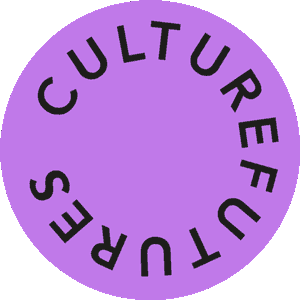
“Talent is not geographical,” Good Chance’s new Artistic Director Amir Nizar Zuabi tells us – and he should know. The award-winning Palestinian theatre-maker and playwright has made shows in his country which transferred internationally and created work in Europe, such as I am Yusuf and This is my Brother made while Associate Director at The Young Vic, using his experience from Palestine.
In 2019 he took on the gargantuan challenge of becoming Artistic Director of ‘The Walk’, a 12-week rolling festival, across an 8,000km route being undertaken by Little Amal, a 3.5-metre-high puppet of a 9-year-old Syrian refugee travelling in search of her mother. Along her route more than 250 partners are taking part in over 85 events between July and November 2021, offering different expressions and chances to be part of how she will be welcomed into their communities.
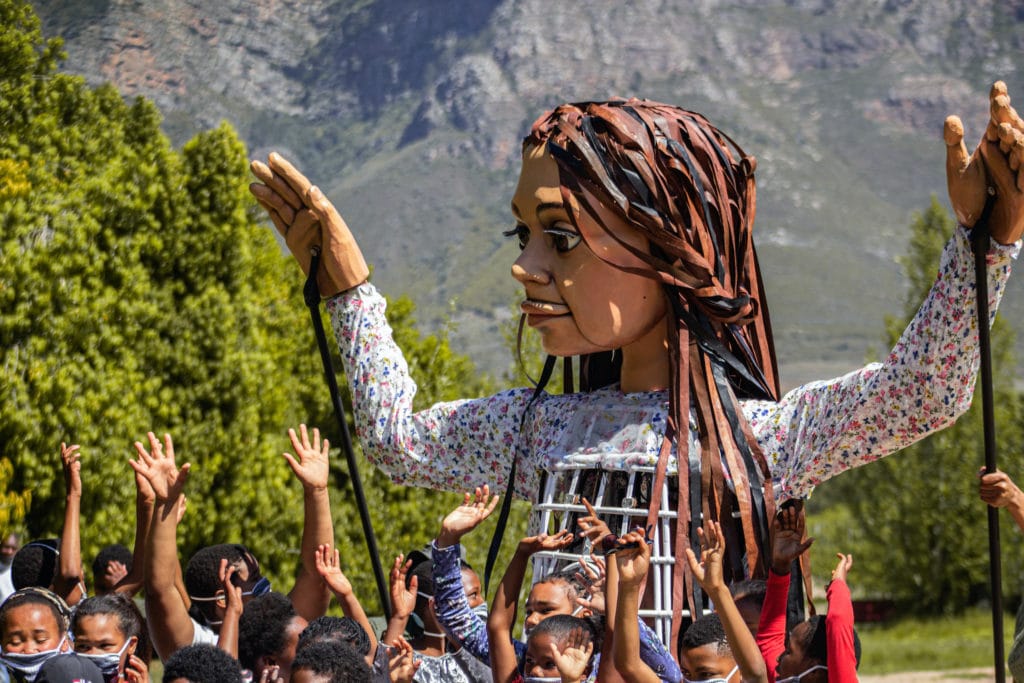
The Walk – Little Amal | Photo Bevan Ross
Amir Nizar is not stopping even when Amal does: stepping into the role of Good Chance’s Artistic Director straight from this extraordinary undertaking, he will continue the organisation’s groundbreaking work with refugee communities and displaced artists. He’s taking the creative helm from playwrights and Good Chance co-founders and artistic directors Joe Murphy and Joe Robertson.
Naomi Webb, Executive Director of Good Chance, began working with ‘the Joes’ in 2017 in France. She’s seen first-hand, through the work that started in the temporary dome structure in the Calais refugee camp known as “the Jungle”, the power of theatre – as stated in Good Chance’s purpose – “to rediscover its ancient power: to connect, unite and reclaim our individual and collective narratives.”
Since then, she has led Good Chance in bringing people together – whether through creative community collaborations or acclaimed international productions – and shining a light on the refugee experience through art. Together with Amir Nizar and the Good Chance team, artists and community, they are hatching ever-more ambitious plans to provide a platform for the voices we urgently need to hear.
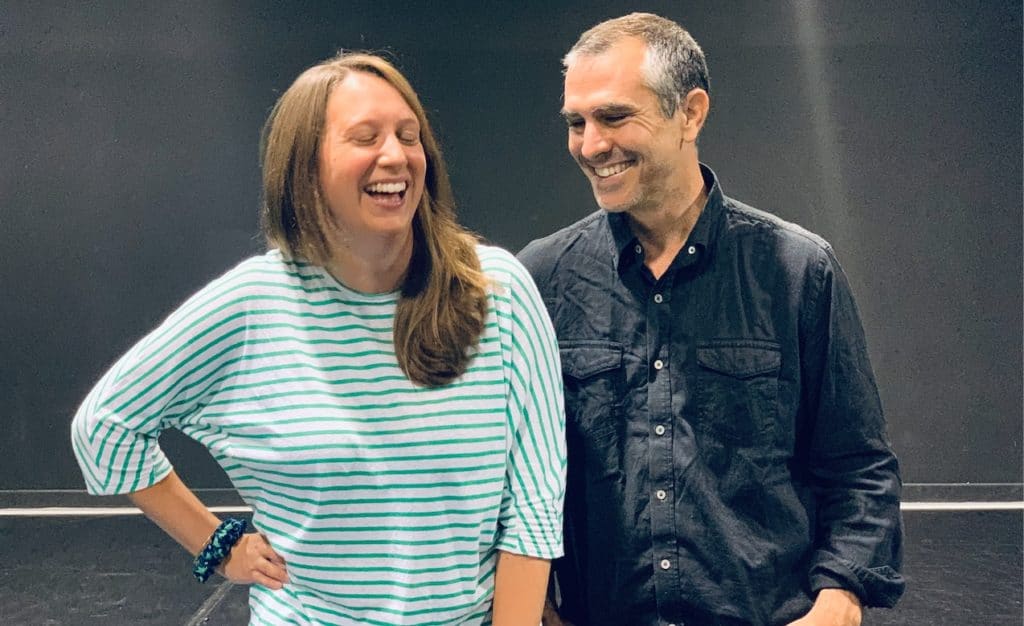
Naomi Webb and Amir Nizar Zuabi
Meet the Good Chance ‘FutureLeague’: Naomi Webb and Amir Nizar Zuabi discuss why movement is what makes us, giving artists a platform and keeping hope alive.
Naomi: Hope is the kernel of all Good Chance does: and it’s more important now than ever. And art is how that hope grows – it creates unexpected connections, it sparks ideas that have consequences we can never even know, and it unites people through their glorious differences as well as through their fundamental shared humanity. We count ourselves lucky that we’ve been able to continue connecting online through the pandemic – especially when planning a massive event across eight countries and two continents! But there is no substitute for being physically together and creating an energy that has the potential to transform the world, even if just for a moment.
Amir Nizar: This year taught everyone what we already know: that flexibility is the name of the game if you want to survive. People that grow up in my part of the world know, inherently, that flexibility needs to be a big part of your thinking process.
Naomi: We’ve been determined to keep as much going as possible – like Change the Word, our poetry collective bringing communities together in the UK. We work with people who have just arrived and are living in hotels temporarily run by the Home Office, in a lockdown where they have no way to get out and connect. As Nazia, one of the members of the collective told us: “These sessions are giving us energy, they’re making us feel alive.”
Amir Nizar: Traditional theatre is partly a Western approach to a meeting: there is a clear relationship between stage and audience. When working with refugee and marginalised communities this kind of set idea has to be more flexible. There is something very interesting in the immediate encounter with an audience from a different perspective, from a different set of powers. The use of non-traditional spaces is part of Good Chance – ‘The Jungle‘, for example, is a redefinition of the relationship between audience and power, and ‘The Walk‘ is a reflection of how you do a play on 8,000 kilometres of stage. That’s the biggest stage ever.
Amir Nizar: Part of the vision for Good Chance is to give agency and a place for excellent artists to express themselves on the biggest stages in the most eloquent way; in a way that means that they are speaking for their community in a very clear, professional and loud voice. Refugee artists need the space and the possibility to speak clearly about things that interest them. Refugees are not necessarily interested in refugees – but they have a specific perspective which needs to be celebrated and heard.
Naomi: In The Dome in Paris, a man called Mohammed – now a long-time friend and collaborator – came to a couple of our weekly ‘Hope Shows’ to see what it was all about. He slowly took part more and more in our workshops, and asked to perform in the next one. He worked with a French actor – one of our many brilliant volunteers – and delivered a 12-minute monologue in Arabic. The whole Dome was silent, hanging off his every word – people knew what he was saying, even when many didn’t understand the literal meaning of the words.
That moment of true, almost transcendent connection is one that will never leave me. And it’s those moments that connect to what Amir Nizar is saying about the most brilliant artists on the biggest stages; Good Chance is all about creating platforms, spaces, moments of encounter just like that, where people from all backgrounds take up equal space on the stage.
Amir Nizar: There are amazing voices in the world who did not go to top fee-paying schools, and do not come from political privilege, but still have deep insights about the world we all live in, and are affected by. They should be heard – not in a charitable sense – because those voices are crucial in today’s tapestry.
What excites me about Good Chance is the work that has already been done and the potential of things that can still be done ahead. There’s a huge challenge and also a gorgeous opportunity to create the right kind of space for artists, and a massive and ambitious platform for them. We tend to go ‘OK, it’s refugee art, it’s nice,’ and it feels great for White audiences to polish their consciences with, but I’m not interested in that at all.

Musee de l’Imigrations in the Good Chance Dome, Paris | Photo Raphaël Hilarion
Amir Nizar: Forty years ago, our voices were not relevant. We were out of power, we were invisible. We were “the barbarians”. Now we are everywhere. We are a part of the social structure, and as such, our voices should be heard. We have a different skillset, we have different aesthetics and different rhythms that are relevant to your life now.
I grew up admiring Shakespeare, he is my hero: but so is Al-Ma’arri. You’d be better off for getting to know Mahmoud Darwish or Al-Ma-arri or hundreds of others that are not part of the canon. The canon needs to change because the world has changed, technology has changed, reality has changed.
Naomi: This is why we’re so excited to go on this next leg of Good Chance’s journey with Amir Nizar. To introduce us and the world’s stages and audiences to these exceptional artists.
Amir Nizar: Being a theatre practitioner in Palestine needs qualities that are essential for something like The Walk or Good Chance. You could call it tenacity, though I’d say it’s pigheaded stubbornness. Another quality is flexibility without which you can’t operate in a place like Palestine. The third, which is crucial, is artistic ambition on a very big scale.
Naomi: With Amir Nizar as Artistic Director, we realise we can push our work so much further. We’re aiming to take Little Amal to the centre of power everywhere she goes, as well as engaging with different communities, schools, families, grassroots humanitarian organisations and large and small scale arts organisations.
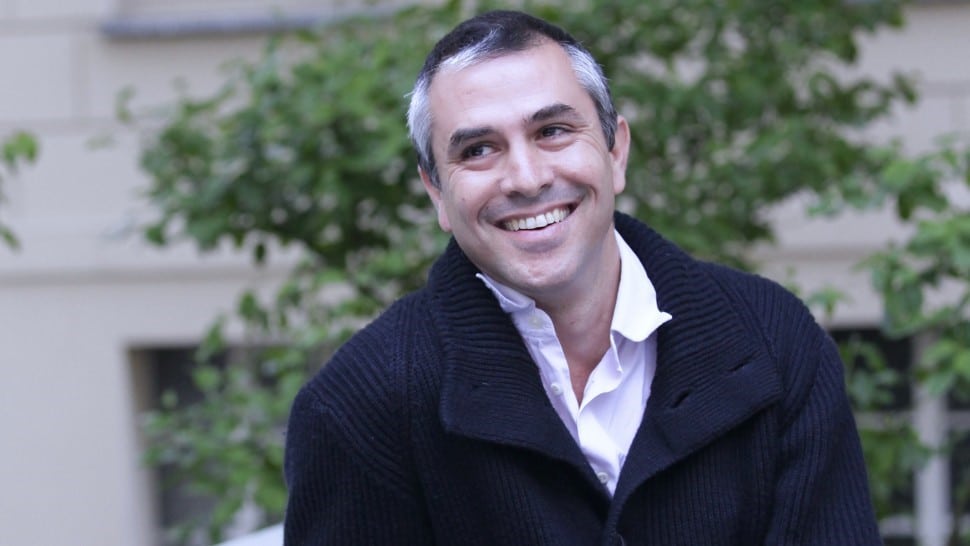
Amir Nizar Zuabi, Artistic Director, Good Chance
Amir Nizar: Working at the Young Vic under artistic director David Lan was a crucial moment in my career – with him I changed from a Palestinian director to a director from Palestine, which is a very big change. The opportunities given to me early in my career meant that when I think of myself as a theatre practitioner, I take myself very seriously. I’m not given any discounts because I’m a poor Palestinian. This meant I needed to commit on a different level as an artist to who I am, and that’s part of why I was able to become a very loud voice for my community and my country.
Saying yes to Good Chance is partly about being able to pass this kind of opportunity on to somebody else. I can say, ‘I know you’re a Syrian refugee, but you’re an artist from Syria who is currently a refugee. Don’t make the refugee part your identity. It’s your status with the Home Office, it’s your experience that you can tap into, but it’s not who you are.’ It’s important to understand these differentiations, so that you don’t reduce the people you’re working with.
Naomi: One of the highlights of the last few years was the opening preview in New York of ‘The Jungle’. We’d had a year-long battle to bring in three essential cast members from countries on Trump’s travel ban list. We didn’t know if the show would transfer to an American audience – we even had to add a line to explain that Calais is the closest place between France and England – but it was just electric. When we saw the international potential of that, it was astounding.
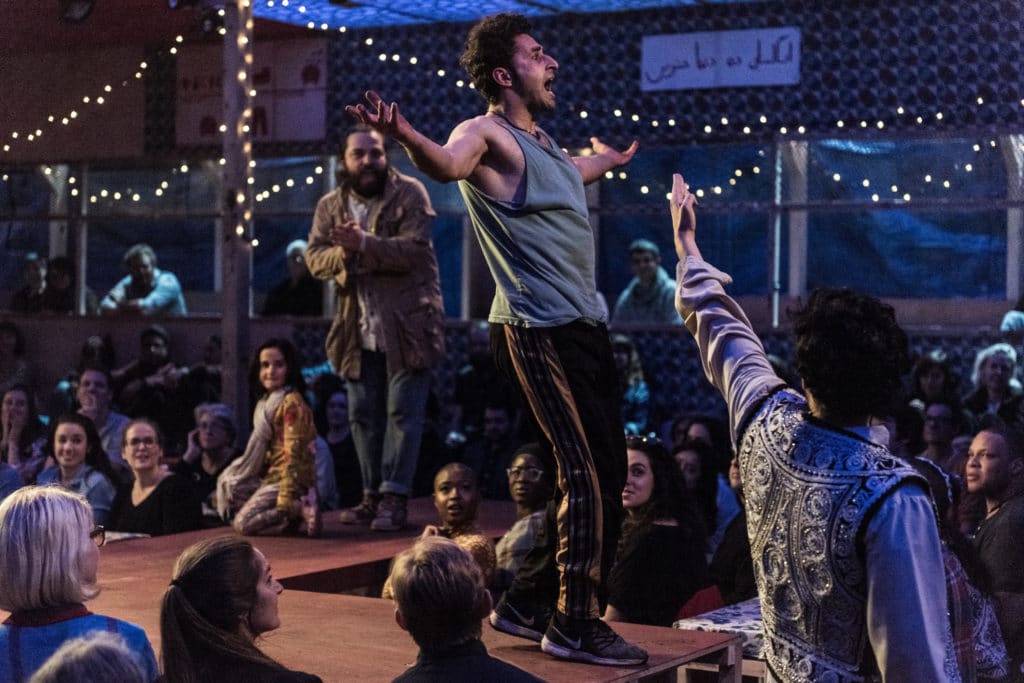
Yasin Moradi, ‘The Jungle’, New York | photo Teddy Wolff
Amir Nizar: Movement is the most natural thing in the world. It makes us who we are. Without movement in and out of England, 90% of what people think of as their culture would disappear. Culture is created by movement, by thoughts coming in and out, by change. I want to challenge the notion of a refugee crisis and show what the potential of this movement is.
Naomi: The climate crisis and the irreversible migration it will lead to is bigger than we can even imagine. Some estimates think that by 2050, 1 billion people will have had to leave their homes because of climate change. We can’t ignore that. We have to accept that people are moving and that we have to find ways to live together. If Little Amal becomes a recognised figure, then we hope that she will have a voice in the climate conversation, to say that yes, people will be displaced by what is happening to our climate – and they are people, they need and deserve to be heard and to be welcomed.
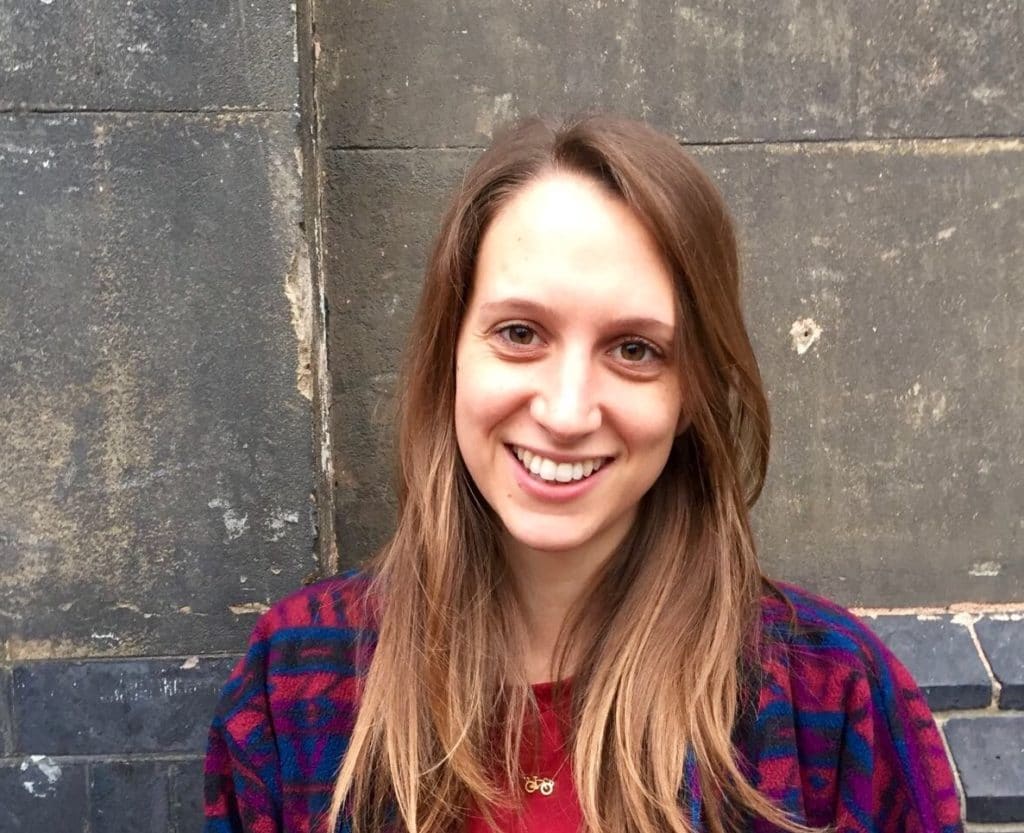
Naomi Webb, Executive Director, Good Chance | photo Holly Foulds
Amir Nizar: The pandemic showed vividly that our societies were kept running by those who people want out. The true engine rooms of our culture keep running because of movement of ideas, of people, of conversations, of exchanges. That’s how we need to regard this. If not, we risk being isolated on our shores and jailed by our borders.
Naomi: Offering new ways into that debate, new openings for those conversations, is crucial. And the debate is not one we want to shy away from. It’s important to us that we should be able to offer information in a different forum – a creative one – or to respond to more negative comments without being aggressive. The Walk, for example, has given us the chance to explain to people who question Amal’s journey that it is a common misconception that you have to claim asylum in the first safe country you come to: this is not actually the law – by law you have a right to seek asylum in any country.
People ask if we aren’t just preaching to the converted. But even people who might think of themselves as liberal minded in our audiences have told us, ‘I knew I kind of cared but I didn’t really understand what was happening – who people living in the Jungle in Calais were, or why they were moving.’
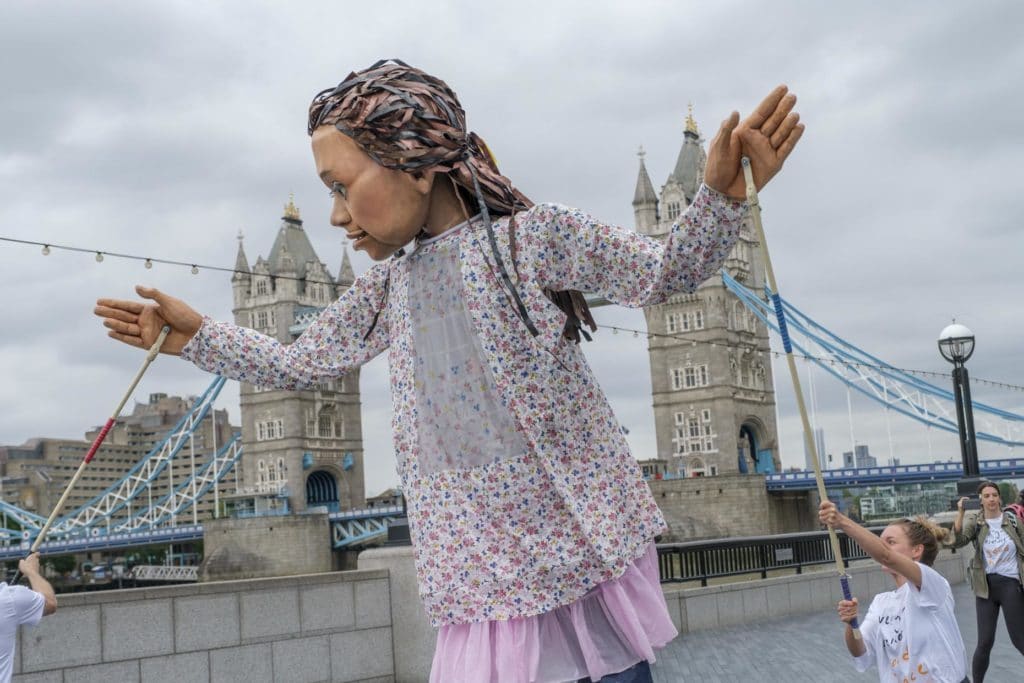
Little Amal in London | photo Nick Wall
Amir Nizar: When I think about what the legacy of The Walk could be, I think about when I was 14, and I saw my first outdoor performance in East Jerusalem. That moment changed my life – I found my vocation. Up until then I was a wild, Middle Eastern kid; from that moment, I became a theatre artist. Just understanding that there was a bigger world, blew my mind.
Naomi: I want The Walk’s legacy to be conversation, in every sense of the word: between two people, between two towns, within a country, within a continent, online, in the media. I want Little Amal to be the most famous little girl of 2021 and beyond, to be talked about across the world, for young people, wherever they are from, to look up to her and have hope.
Amir Nizar: My FuturePower would be… to create a huge swap and take all the first world and put it in what is considered third world for a month – and vice versa. Having people think about and understand reality in a completely different way would solve a lot of issues.
AtlasAction ► Find out more about the different ways you can get involved with the work of Good Chance – and follow Little Amal’s progress, check the schedule of events or support her journey here.
► Co-founders of Good Chance will be speaking at Fixing the Future Festival, check out the full festival programme to find more inspiring stories.
Naomi Webb and Amir Nizar Zuabi of Good Chance were talking to Cathy Runciman, co-founder of Atlas of the Future.
Main photo: The Jungle NY (c) Teddy Wolff

